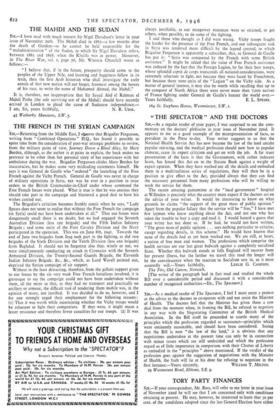THE FRENCH IN THE SYRIAN CAMPAIGN
SIR,—Returning from the Middle East, I observe that Brigadier Fergusson, writing from "Combined Operations" H.Q., has found it possible to spare time from the consideration of post-war strategic problems to review, from the military point of view, Journey Down a Blind Alley, by Mary Borden, although, as the author is at pains to explain, the book makes no pretence to be other than her personal story of her experiences with her ambulance during the war. Brigadier Fergusson chides Mary Borden for inaccuracies, but he makes some very misleading statements himself. He says it was General de Gaulle who "ordered" the launching of the Free French against the Vichy French. General de Gaulle was never in charge of military operations in Syria, nor was he ever in a position to issue orders to the British Commander-in-Chief under whose command the Free French forces were placed. What is true is that he was anxious they should take part in the campaign and blustered a good deal to have his wishes carried out.
The Brigadier's criticism becomes frankly comic when he says, "Lady Spears does not seem to realise that without the Free French the campaign (in Syria) could not have been undertaken at all." That our forces were dangerously small there is no doubt, but we had engaged the Seventh Australian Division (less one brigade) and the Fifth Indian Infantry Brigade ; and some units of the First Cavalry Division and the Navy participated in the operation. This was on June 8th, 1941. Towards the end of June two brigades from Iraq took part in the fighting, as did two brigades of the Sixth Division and the Tenth Division (less one brigade) from Baghdad. It should not be forgotten also that, wisely or not, we were simultaneously conducting an attack in Cyrenaica with the Seventh Armoured Division, the Twenty-Second Guards Brigade, the Eleventh Indian Infantry Brigade, &c., &c., which, as Lord Wavell pointed out, deprived the Syrian campaign of air support.
Without in the least detracting, therefore, from the gallant support given to our forces by the six very weak Free French battalions involved, it is grotesque to say the campaign could not have been undertaken without them, all the more so that, as they had no transport and practically no artillery or armour, the difficult task of rendering them mobile was, in the opinion of many, not justified. It was decided to do so, however, and I for one strongly urged their employment for the following reasons: (I) That it was worth while ascertaining whether the Vichy troops would be reluctant to fight their compatriots. If they were, it might mean a lesser resistance and therefore fewer casualties for our troops. (2) It was always justifiable, as our manpower resources were so strained, to get others, when possible, to do some of the fighting.
I and those who thought as I did were wrong. Vichy troops fought the harder for the presence of the Free French, and our subsequent task in Syria was rendered more difficult by the legend created, to which Brigadier Fergusson is apparently a subscriber, that, as General de Gaulle has put it: " Syria was conquered by the French with some British assistance." It might be added that the value of Free French assistance was reduced by the fact that the Foreign Legion, by far their best troops, whose splendid esprit de corps transcends all national considerations, were extremely reluctant to fight, not because they were faced by Frenchmen, but because there were units of the " Legion " on the Vichy side. As a matter of general interest, it may also be worth while recalling that up to the conquest of North Africa there were never more than 7,000 natives of France fighting under General de Gaulle's banner the world over.— Yours faithfully, E. L. SPEARS.
164 St. Stephens House, Westminster, S.W. z.


































 Previous page
Previous page